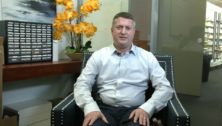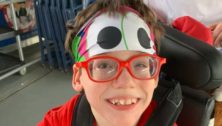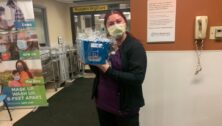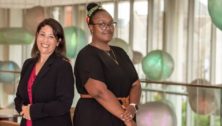Jenkintown’s Salus University and Vanderbilt Pilot Helps Bridge the Gap in Physical Therapy for Vision Impaired
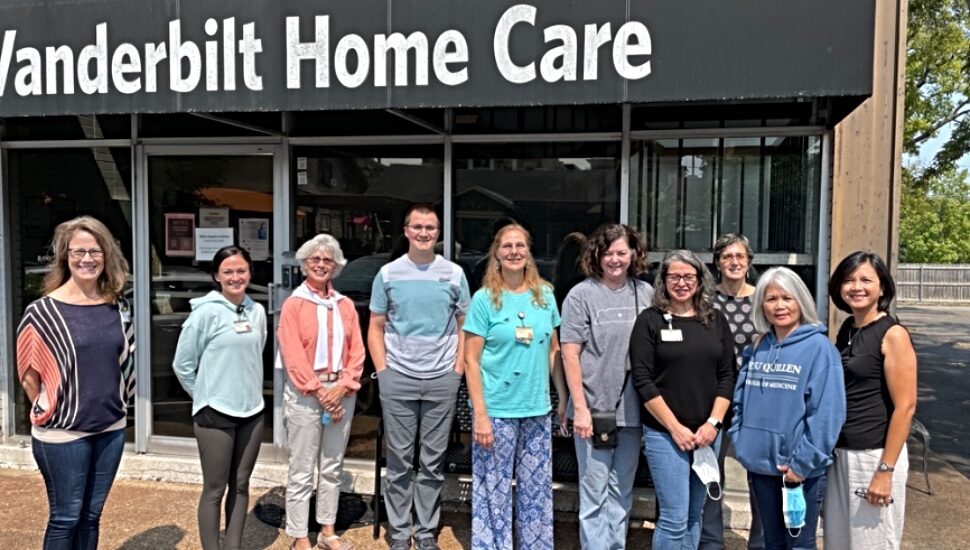
Salus University’s Blindness and Low Vision Studies (BLVS) department recently developed and implemented a pilot program in partnership with Vanderbilt University Medical Center in Nashville, Tennessee, specifically for Vanderbilt’s on-staff Physical Therapists (PTs), that provided Orientation and Mobility (O&M) skills-based training PTs could offer their patients.
“Unfortunately, there is frequently a dearth in the number of O&M instructors available, so people would wait long times to have their immediate needs met,” said Jamie Maffit, MS, COMS, CLVT, director of Salus University’s O&M program. “So the idea was to provide skills-based training on selected indoor O&M skills for the physical therapists who are often the first rehabilitation professional to meet with the person post-low vision exam and have them provide those first-line basic level skills. And, then refer for further O&M if needed.”
The idea to teach PTs to offer basic O&M instruction to patients was developed by Carlene Lebous, a retired CEO and founder of vision rehabilitation facilities and former O&M specialist.
Through her experience in both rehabilitation and healthcare, she identified a tremendous gap between healthcare providers and the awareness of and referrals for vision rehabilitation services.
“My vision a number of years ago was to look at how we could bridge this gap so that people with vision loss do not fall between the cracks. It’s been something that has been a part of my life for decades,” said Lebous, who is also a member of the Vanderbilt Eye Institute (VEI) advisory board.
The project’s initial stages included Lebous and Joshua Robinson, OD, FAAO, director of Low Vision Rehabilitation at the VEI, whose work focuses on the expansion of low vision services.
Lebous eventually connected with Fabiana Perla, EdD, COMS, CLVR, chair of the BLVS department at Salus, and Maffit to collaborate in the development and launch of the pilot project.
The unique partnership allowed Salus to work directly with Dr. Robinson at the VEI — whose entire patient base consists of people with permanent vision impairment — and was able to design the program with his referrals in mind.
“It’s well understood in this field, and in the field of rehabilitation and vision impairment in general, that there is a shortage of certified orientation and mobility specialists to whom I can refer,” said Dr. Robinson. “So, when I have a patient who needs these services, it’s often limited by the manpower out there providing the services and, in some instances, the out-of-pocket costs associated. There is such a low supply and high demand and it’s hard to get the patients what they need in a timely manner.”
After about a year of development, the program launched as an eight-week course, combining online and in-person instruction. Dr. Perla and Maffit traveled to Nashville to provide two days of hands-on training to seven Vanderbilt PTs, who received a micro-credential, a certificate, and PT continuing education credits for their participation.
Some of the Vanderbilt PTs who participated were unaware of blindness and low vision rehabilitation services, including Alessandra Cannon, who works for Vanderbilt Home Care Services and has been a physical therapist for 30 years.
“If the possibility exists that I’m going to lose my sight, I would be interested in learning more about O&M,” Cannon said. “What O&M does is keep you as independent as possible and you’re not in a position of being helpless. Having those services can make you more independent and feel good about yourself. It’s wonderful to have those services available and we have been referring our patients to some of the rehab specialists in the area.”
Since the program was the first of its kind and yielded extremely positive results, Lebous said Vanderbilt will continue to evaluate the referral base from Dr. Robinson to the PTs to continue to validate the importance of the project.
“What I observed as a former O&M specialist during the hands-on training was qualified, seasoned physical therapists that had been working with individuals with vision loss for a number of years, but who realized how much this training allowed them to be more effective with these patients,” said Lebous. “It truly opened a door for them to be able to provide better services to more individuals in need.”
For more information about Salus University, please visit here.
Connect With Your Community
Subscribe for stories that matter!
"*" indicates required fields


























